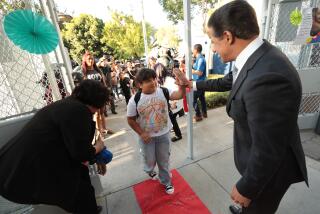L.A. 4th-Graders Still Low in Reading
- Share via
Los Angeles fourth-graders’ reading scores this year on a national test ranked them toward the bottom of 10 big-city school districts, behind students in New York, Chicago, Atlanta and other urban systems, a federal study showed Wednesday.
Los Angeles Unified fourth-graders’ performance on the math portion of that exam was somewhat better, landing them in the middle rung of the 10 school districts nationwide that participated this year in the National Assessment of Educational Progress.
Just 11% of Los Angeles fourth-graders reached at least the proficient level in reading, the same percentage as last year. Among the 10 cities, only Cleveland and Washington, D.C., scored worse.
Thirteen percent of Los Angeles’ fourth-graders were proficient or better in math this year, the first time the exams provided math scores for individual districts. That tied Los Angeles with Atlanta, but left it behind San Diego, New York, Houston and Charlotte, N.C.
Cleveland, Washington, Chicago and Boston showed lower math-proficiency levels in the fourth grade than Los Angeles.
Nationally, 30% of fourth-graders were at least proficient in reading; 31% met that target level in math. Proficiency represents solid academic performance and is the target achievement level on the tests.
Los Angeles school officials said the district’s vast number of students with limited English skills put the district at a disadvantage: 56% of Los Angeles fourth-graders taking the reading test this year were still learning English, compared to 35% in San Diego, 21% in Chicago, 11% in New York and 2% in Atlanta.
And Los Angeles excluded a much smaller percentage of limited-English students and those in special education from the tests.
“We have taken an aggressive attitude of pushing our kids into this test,” said L.A. Unified Supt. Roy Romer.
Fourth- and eighth-graders in thousands of school districts across the country took the reading and math tests earlier this year, and scores for states and the nation were announced last month. Those scores showed California ranking among low-scoring states nationally in reading and math.
Separate district scores were released publicly Wednesday only for the 10 city districts that volunteered for the comparative study. The 10 districts had higher percentages of low-income and minority students than the nation as a whole.
The San Diego City Unified School District was the only other California school system included in the study.
San Diego’s fourth- and eighth-graders fared much better than their peers in Los Angeles in reading and math but also fell below national achievement levels. For example, 22% of San Diego fourth-graders were proficient or better this year in reading, as were 20% in math. San Diego’s scores for last year were not available because the district was not included in the study then.
But compared to some cities in the study, San Diego and Los Angeles excused far fewer students with limited English abilities from the test. Los Angeles excluded 9% and San Diego 11% of students from the reading exam because they did not fully understand English.
In contrast, Houston excluded 61% of its fourth-graders. That is allowed under the federal program.
“Demographics clearly have a pretty big impact,” said Peter Bell, manager of research and reporting for the San Diego district. Students who are disadvantaged or new to English “are going to do poorly,” Bell said. “We’re not saying there’s nothing that can be done to help those children, but certainly it’s a greater challenge to help them perform better.”
Darvin Winick, chairman of the National Assessment Governing Board, which oversees the exams, said such differences could make it difficult to draw reliable comparisons across the 10 districts, and especially those in California, where schools test most students regardless of their familiarity with English.
“Fourth-grade reading [scores] in California districts in relation to the other districts may be depressed because of the state testing policy,” Winick said. “That’s borne out by the data.”
Overall, the results from the 10 districts showed that their fourth- and eighth-graders, except those in the Charlotte-Mecklenburg school system, fell below the national averages in reading and math.
The scores also showed a persistent achievement gap in reading and math -- for both fourth- and eighth-graders -- between white and Asian students on one hand and Latino and African American pupils on the other.
Among Los Angeles fourth-graders, for example, 28% of both white and Asian students were at least proficient in reading this year, compared to 8% of African Americans and 7% of Latinos.
Among Los Angeles eighth-graders, 29% of whites, 25% of Asians, 3% of Latinos and 2% of African Americans were at least proficient in math.
Such findings troubled educators eager to improve the educational opportunities of minority students.
“These gaps ... are still way too large,” Kati Haycock, director of the Education Trust, a nonprofit Washington advocacy group, said in a statement. “They are a reminder that we have much work to do in ensuring that African American, Latino and low-income youngsters are placed in rigorous classes and taught to the same high levels as other students.”
Los Angeles school officials, however, cited one hopeful trend. The reading scores of limited-English fourth-graders rose from last year.
*
(BEGIN TEXT OF INFOBOX)
Report card
Percentage of fourth-grade students in urban public school districts at or above proficient level in 2003 achievement tests for mathematics and reading.
*--* Math Reading Nation 31 30 Atlanta 13 14 Boston 12 16 Charlotte, N.C. 41 31 Chicago 10 14 Cleveland 10 9 District of Columbia 7 10 Houston 18 18 Los Angeles 13 11 New York 21 22 San Diego 20 22
*--*
*
Source: U.S. Department of Education
More to Read
Sign up for Essential California
The most important California stories and recommendations in your inbox every morning.
You may occasionally receive promotional content from the Los Angeles Times.










